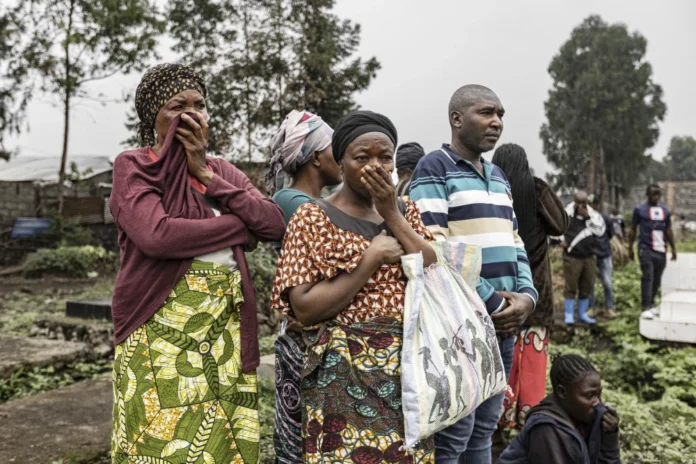Over 150 women suffered sexual violence during a mass prison escape in the Democratic Republic of Congo, according to the United Nations.
Officials in the central African nation reported that male inmates assaulted at least 165 women after seizing the opportunity to break free from Muzenze prison. The escape occurred on January 27, coinciding with an advance by the M23 rebel group toward Goma, an eastern city already struggling with instability.
A video shared on social media shows hundreds of prisoners fleeing as black smoke rises and gunshots echo in the background. The footage captures the chaos as inmates overpower prison security and run toward freedom. This mass breakout intensified security concerns in Goma, a city home to roughly 2 million people. The humanitarian crisis continues to unfold as authorities attempt to regain control of the volatile situation.
Vivian Van de Perre, the United Nations’ representative for the DRC, described the conditions in Goma as extremely dire. She explained that many residents were fleeing the city, fearing escalating violence and worsening health conditions. The United Nations expressed deep concern about the potential for disease outbreaks in overcrowded displacement camps, which currently shelter thousands of people.
Despite these alarming reports, the United Nations admitted it had been unable to verify the full extent of what happened at Muzenze prison.
Due to ongoing conflict in Goma, gaining access to firsthand information remains difficult. However, accounts from officials and witnesses paint a grim picture of widespread sexual violence and human rights violations. The situation continues to evolve, raising fears of further atrocities.
Meanwhile, the M23 rebel group, allegedly backed by Rwanda, advanced farther south, capturing the mining town of Nyabibwe. This move appeared to violate a unilateral ceasefire the group had declared just days earlier. The rebels’ recent actions suggest a growing ambition to expand their control, despite previous statements claiming they had no intention of taking additional territory.
Nyabibwe’s capture puts the rebels within 40 miles of Bukavu, a major provincial capital in the South Kivu region. Last week, M23 leaders insisted they would not target Bukavu, but their recent advance raises doubts about their intentions. The possibility of continued rebel expansion has heightened fears of a broader conflict that could destabilize the entire region.
Tensions between the DRC and Rwanda have escalated, with Congo accusing Rwanda of supporting M23 rebels to exploit valuable mineral resources. Rwanda, however, maintains that it is acting in self-defense and protecting ethnic Tutsis. This long-standing dispute has fueled violence in eastern Congo, where armed groups operate with relative impunity.
The M23’s capture of Goma last week forced hundreds of thousands of civilians to flee, creating a worsening humanitarian crisis. Many displaced residents face dire conditions, with limited access to food, clean water, and medical assistance. The ongoing conflict threatens to further destabilize an already fragile region.
The United Nations’ Human Rights Office (OHCHR) warned that escalating violence could lead to an increased use of sexual violence as a weapon of war. This pattern has been observed in previous conflicts in eastern Congo, where rape has been systematically employed to terrorize communities. The recent mass sexual assaults underscore the urgent need for intervention and justice.
Reports of sexual violence are not limited to rebel forces. The OHCHR confirmed that 52 women were raped by Congolese troops in South Kivu, including multiple instances of gang rape. These revelations highlight the widespread nature of the problem, affecting victims from all sides of the conflict. Sexual violence remains a persistent and devastating tactic in the region.
The DRC’s government introduced an action plan in 2014 to combat sexual violence within the military.
However, a United Nations report five years later found that perpetrators still operated with impunity. The lack of accountability has allowed crimes against women to continue, despite international condemnation and calls for reform.
Doctors Without Borders, also known as Médecins Sans Frontières, reported that it treated over 25,000 survivors of sexual violence in the DRC in 2023. This figure represents the highest number ever recorded by the organization in the country. The staggering numbers illustrate the severity of the crisis and the urgent need for stronger measures to protect vulnerable populations.
The recent mass prison break has intensified concerns about Congo’s security situation and the rising tide of sexual violence. Human rights organizations continue to call for urgent intervention to prevent further atrocities. The international community faces increasing pressure to respond to the crisis and hold perpetrators accountable.
As violence spreads and civilians suffer, the need for a coordinated humanitarian response grows more critical. Aid agencies struggle to provide sufficient support to those displaced by the conflict. The lack of resources and ongoing instability make it difficult to address the needs of affected communities.
With the M23 rebel group continuing its advance, the risk of further displacement remains high. The humanitarian situation in eastern Congo is deteriorating rapidly. Without immediate action, more civilians will fall victim to violence, exploitation, and displacement.
Efforts to broker peace have so far failed to yield lasting solutions.
The recent ceasefire announcement by M23 appears meaningless in the face of continued aggression. Diplomatic efforts must intensify to prevent further escalation and establish a path toward lasting stability.
The DRC remains one of the most conflict-ridden countries in the world, with its eastern provinces suffering from decades of unrest. The ongoing crisis highlights the need for stronger governance, security reforms, and international support to break the cycle of violence.
As the situation unfolds, the world watches to see how Congo and its neighbors will respond. The humanitarian crisis demands immediate attention. The international community must act swiftly to prevent further suffering and ensure justice for victims.


